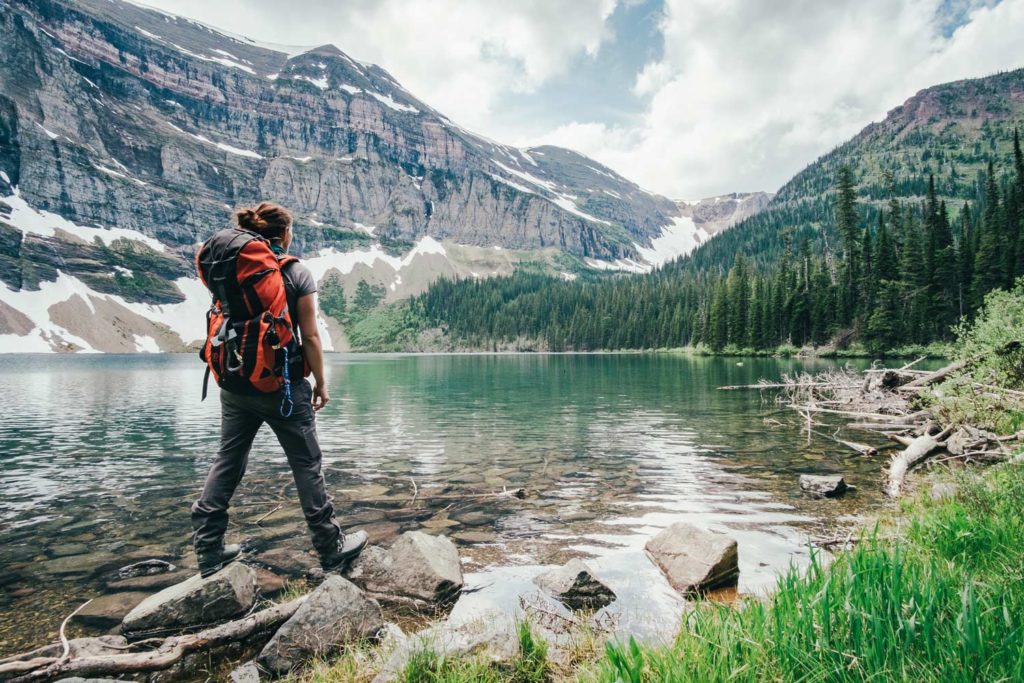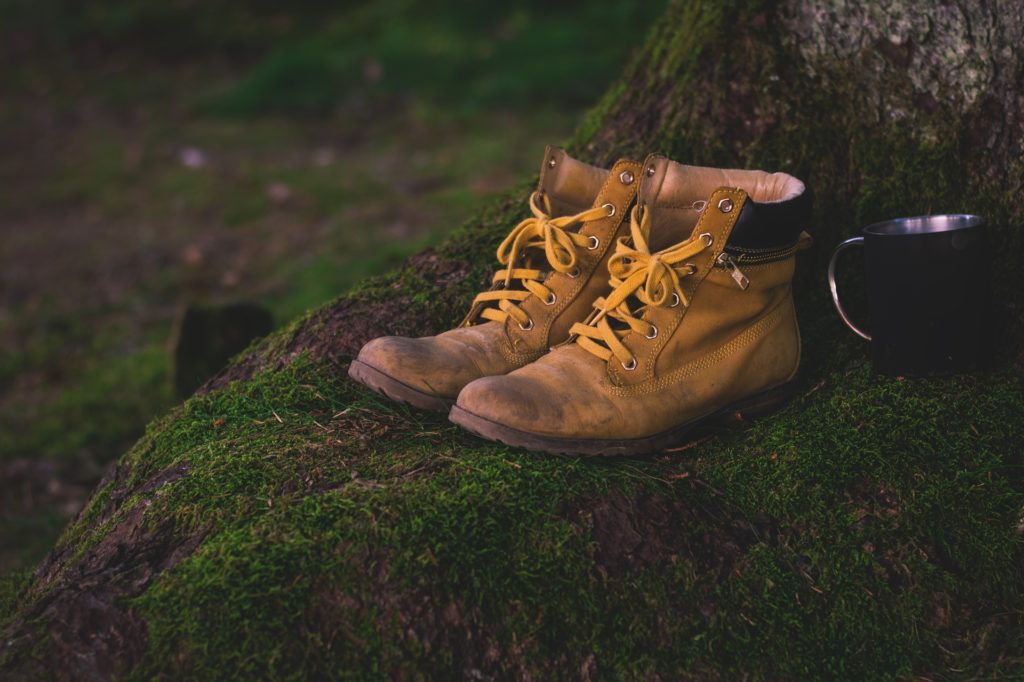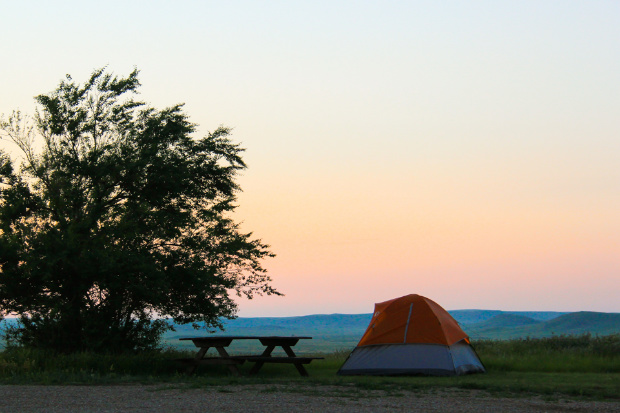Backpacking is an adventure that blends backcountry camping and hiking. If you’re looking to get away from it all and feel truly free, then consider taking a backpacking trip. It will leave you feeling closer to nature, refreshed, and fully immersed in the outdoor experience. If you’re new to backpacking this list of 10 tips for having a better backpacking experience will help you to prepare for your trip.
Click here to learn about staying safe at a backpacker hostel.
1. Choose A Backpacking Destination
If you’re a beginner, it’s best to choose an easy backpacking destination to start. Look at it this way, if the trip is too easy then you simply have more time to explore the backcountry. Try to pick a place that’s closer to home for your first adventure. Choose a well-traveled trail with established backcountry camping sites to ensure there are other backpackers around to help if you have any difficulties.

2. Finding the Perfect Backpack
When beginning, keep your investment in gear low. The 2 most important items for a backpacker are boots and a pack. When it comes to choosing a backpack it is completely based on personal preference, so choose what works best for you. The most important thing about a backpack is that it feels good when it is weighed down by gear. The best method is to try backpacks on in person. Bigger is not always better, buying a smaller backpack will help with weight.

3. Finding the Right Boots
Full or mid-height hiking boots are recommended when it comes to backcountry backpacking. A Vibram sole is the backpackers standard, and the longer your trip and the heavier your pack, the more durable your boots will need to be. Although many long-distance through-hikers will backpack in running shoes, knowing that one pound of weight on your feet is the equivalent of five pounds of weight in your pack. Make sure to bring extra shoelaces, just in case!
4. Train Before Your Backpacking Trip
If you’ve never been backpacking before, it’s crucial that you train prior to your trip. The best way to train is to hike with your backpack fully packed. This will enable you to get used to hiking with weight on your back. Try some day hikes in your area, or head to the gym and jump on the elliptical or stair climber. It’s also a great idea to weight train shoulder and back to prepare for carrying your fully loaded backpack.

5. Bring The Right Gear
When backpacking you will be carrying all of your gear on your back. Therefore backpacking gear needs to be as light and compact as possible. There are absolute essentials that you will need including –
Tent – a 2 person tent is the most economical and weighs less than a larger tent. Choose a tent that is rated for 3 seasons, spring through fall.
Sleeping Bag – if you choose to buy a sleeping bag, a synthetic bag is great for beginners. They tend to be more versatile than the alternative down-filled sleeping bags.
Sleeping Pad – if you want a good night’s sleep then cushioning is crucial. A good first sleeping pad option is a self-inflating pad, they tend to be middle of the road in terms of investment, ease, and comfort.
Stove – you’ll need a stove while backpacking. If you already have a single burner camping stove that’s a great option as a beginner. If you need to purchase a stove, a gas canister stove is optimal because of its affordability and ease.
Water Treatment – although backcountry water may look pristine, you just never know what parasites could be lurking in the water. There are a few different options, chemical treatment tabs/drops or a filtration system.
Kitchen Supplies – you’ll need to bring a few kitchen supplies on your backpacking trip. Make sure to only bring enough pots, pans, plates, cups, and utensils for your pre-planned meal (more on that later).
6. The Right Clothing For Backpacking
While you may think you need to buy a ton of hiking clothes for your first backpacking trip, that’s just not true. Go through your fitness gear and find clothes that are moisture-wicking and quick-dry fabrics. Avoid cotton because it will take an incredibly long time to dry. Layers are key when backpacking so make sure to bring a base layer (long underwear), hiking layer (nylon pants + t-shirt), insulation (jacket), and rain gear.
7. Plan Your Backpacking Meals
If you’re beginning with an overnight backpacking trip plan for dinner, breakfast, and a few lunches. Freeze-dried backpacking food is the easiest and lightest option, but it can be very pricey. To save money head to your local grocery store instead. Here are a few meal ideas,
Breakfast – hot oatmeal, breakfast bars, coffee, and tea mixes
Lunch – high calorie and high protein energy bars, trail mix, bagels, jerky, dried fruits, and nuts
Dinner – all in one meal like packaged noodles or rice bowls
Make sure to practice the Leave No Trace principles pack out what you pack in and only leave footprints.
8. Packing a Backpack 101
You’ll want to pack your backpack in advance to be sure that everything fits. Keep in mind that where you place items will affect how comfortable your pack is to carry. A general backpacking rule of thumb is to put cooking gear, water, and heavier items in the center of your backpack, and pack your lightweight items around them.
9. Bring A Friend
While backpacking solo is exhilarating it can also be dangerous and isn’t recommended for beginners. If you have an emergency there could be no one around to help you, particularly if you are going deep in the backcountry. Bring a friend with you for safety, plus it will make the experience much more fun!
10. Let Someone Know Your Plan
The idea of backpacking is to escape from it all, but someone really does need to know where you will be. Leave a detailed trail itinerary on where you plan to hike and camp each night with a friend or relative. If you are in a remote area a GPS tracker is also a great idea.
Check out this website for more ideas on trip and backpacking ideas.
Now that you have these 10 tips for having a better backpacking experience, what are you waiting for? Get out and explore the backcountry and get away from it all!
